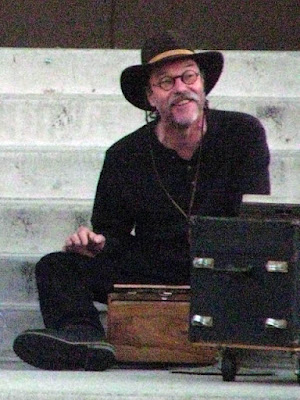We Californians are enduring a gubernatorial combat between former California governor Jerry Brown, who wants his old job back, and former E-Bay CEO Meg Whitman, who apparently can't find work elsewhere. Brown has been a politician all his life and has achieved a personal net worth of $4 million (source). Whitman rode the crest of the Internet boom and has a net worth of $1.2 billion. Billion! That ties her for number 332 on the list of the 400 richest Americans (source). So far she's spent more than 10% of her fortune trying to get elected.
Why is becoming governor of California worth millions of dollars to Meg? Meg tells us that she isn't running for office because of money.
I know she isn't running because she wants a paycheck of $206,000. Meg has SO much money already that she could pay herself a governor's salary out of pocket for over 63 centuries - roughly until the year 8310. If she puts all her money in a simple savings account (one with a paltry .25% interest) in one year her money will earn over 157 times the governor's salary. Honestly, that's enough for even rich people to live on - or so I'm told.
I actually think Meg wants to be Governor mostly because of the money. Someone who has accumulated so much money (and done it so quickly) probably spends her time thinking about nothing else except money.
Meg argues that her vast horde of money will keep her independent. I think that's wrong. As governor I think she would be a hostage to her money pile and would have trouble making decisions which would adversely affect the net worth of the ultra-wealthy.
Meg Whitman's wealth is vastly out of scale for our society. It's far beyond anything an average American can ever hope for. Immense wealth gives its owner great power. It is obscene for a few individuals to have so much wealth and influence. America is harmed by this disparity between richest and poorest. And recent tax laws have been increasing the distance. That's very wrong.
It's time to bring back a more progressive tax code - where people with higher income pay ever higher tax rates. Government is supposed to take enough money away from people who can get along just fine without it in order to help people who really need help. People who pay high taxes ought to think of paying taxes as simple patriotism. The idea is elementary, but, alas, the details are staggeringly complex.
Californians have been handed this line that "my obscene wealth makes me a better politician" before - by our current failure of a governor, actor Arnold Schwarzenegger (net worth $400,000,000 source). Meg Whitman's talking points in her current campaign are eerily similar to what Arnold has told us in previous elections. Watch this fun Jerry Brown attack ad:
Arnold, who now must bear the burden of an actual political record, was clearly lying when he recited these nostrums. California has an immense revenue problem. In no way have Schwarzenegger's actions in Sacramento resembled those of a good business leader. He has not created jobs. He has not made government more efficient.
All the while Arnold has taken over $143,000,000 in special interest money (source) and we must suspect that he says the things he says because other people paid him to say them. After all, Arnold's real experience is as an actor and that's what a professional actor does. Here's a fun compendium of 160 things he was paid to say (many of which are not safe for the ears of your co-workers or republican prudes):
Want more? Here's another 130.
Imagine California actually was a private business and that Meg Whitman applied for the job of governor. Let's listen in on the initial interview:
Meg Whitman's housekeeper (she's the one who claimed in public that she had been fired by Whitman from her $23 an hour job of nine years because candidate Whitman finally realized that having an undocumented maid was bad political form) became a hot topic during this election. Whitman's campaign countered this mud with a tape in which one of Jerry Brown's assistants referred to Meg as a "whore" because she accepted an endorsement from a police union in exchange for exempting members of that same union from her own proposed pension cuts.Human Resources Interviewer: Welcome, Meg. Being governor of California involves lots of politics. What political experience have you had?Meg Whitman: All my experience was running corporations. I feel that I must have been very good at that job because I made a mountain of money.H.R. Interviewer: Here at California Ltd. we believe that politics is the ability to convince people who already have money to hand it over to us so we can give it away to people who need it more than they do. Is that something you know how to do?Meg Whitman: I think government should allow people with money to accumulate even more money so they can pay salaries to people who need money.H.R. Interviewer: How many California jobs have you created with your own mountain of money?Meg Whitman: I had a housekeeper for a while.H.R. Interviewer: Okay, thank you for coming in. We'll call you if we need more information.
During one of those unwatchable debates Meg expressed great outrage at being called a whore:
I think every Californian, and especially women, know exactly what's going on here. And that is a deeply offensive term to women.It seems that Meg doesn't understand the most obvious implication of the word whore. A whore is someone who "gets paid for it". "It" can be anything, not just sex, and in these gender neutral times the person doesn't even have to be female.
Being a whore means doing it for money.
You can see a list of contributors to the Whitman campaign here.
If you are a California voter and you read this before November 2, 2010, please vote for Proposition 19 (because the current situation clearly isn't working) and also for Proposition 25 (because the current situation clearly isn't working.)
Read a Sunday Times (of London) article about current U.S. income tax rates:
Warren Buffett, the third-richest man in the world, has criticised the US tax system for allowing him to pay a lower rate than his secretary and his cleaner.L.A. Times columnist Steve Lopez writes about what Meg Whitman could have done with her money instead.
L.A. Times columnist Michael Hiltzik writes about why big-time CEOs make lousy politicians.
Money Tags: California election. . . Meg Whitman. . . political influence. . . prostitution. . . obscenity










